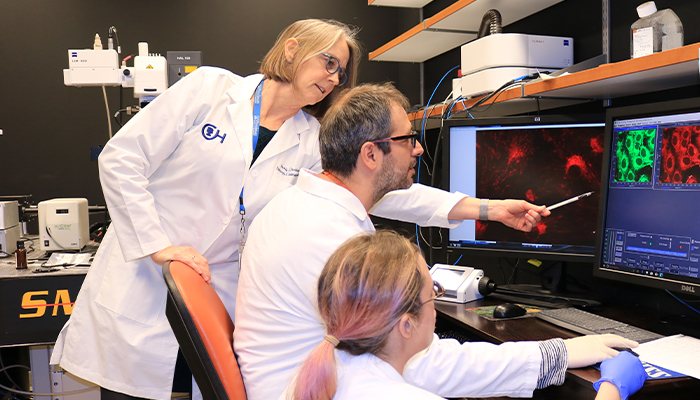HOW CAN WE HELP YOU? Call 1-800-TRY-CHOP
Raymond G. Perelman Center for Cellular and Molecular Therapeutics
Discovering new gene and cell therapies to better treat and potentially cure debilitating disorders is a driving factor behind the innovative research in the Raymond G. Perelman Center for Cellular and Molecular Therapeutics (CCMT). Established in 2005, the Center is dedicated to understanding, developing, and applying gene and related cell and nucleic acid therapies and the promotion of professional and public education in the field.
The CCMT aims to be in the forefront of pediatric medicine by fostering a multidisciplinary approach to leading edge research endeavors related to gene transfer, gene regulation, gene discovery, cell therapy, experimental models, correction of genetic and acquired diseases and clinical trials. These approaches will lead not only to a variety of applications in the treatment of inherited disorders, but also to the treatment of acquired and complex disorders, including heart disease, infectious diseases, neurodegenerative diseases, blood disorders and cancer. The CCMT has the capability to move basic pre-clinical discoveries rapidly into clinical application.
To support rapid translation from bench to bedside, the CCMT has the resources to manufacture a wide range of viral and non-viral vectors to transfer genes of interest and the capability of separating and manipulating human cells in order for gene therapy trials to be possible. Supporting the Center's efforts are three core units – the Human Pluripotent Stem Cell Core, Clinical Vector Core, and Research Vector Core – all crucial for advancing both basic and translational research in gene and cell therapies. The diverse group of researchers housed in the CCMT includes neuroscientists and hematologists well versed in the latest technologies and positioned at the forefront of cutting edge science.

The Cell and Gene Therapy Collaborative aims to significantly increase the number of potential new pediatric cell and gene therapies that are the product of CHOP-led research, and to accelerate the pace of clinical development in order to provide new therapies to children.
The Clinical In Vivo Gene Therapy group supports the development and conduct of in vivo gene and molecular therapy trials at CHOP, as well as the implementation of these novel molecular therapies into the clinic post licensure.
Combining our proven clinical expertise in hemophilia gene therapy and care of bleeding disorders with our research expertise to solidify Children’s Hospital of Philadelphia as the premier center for the therapeutic development and advanced clinical care of inherited bleeding disorders.



